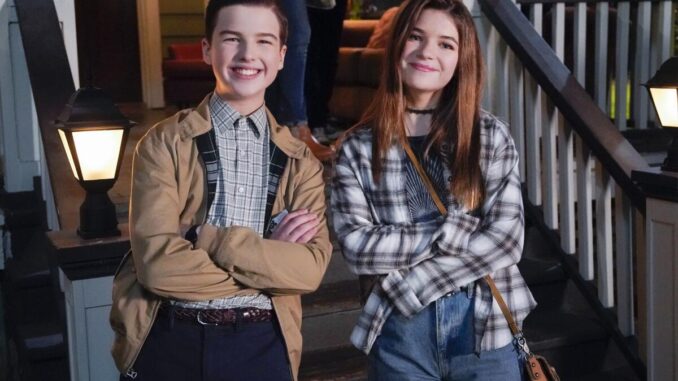
Mary’s (Zoe Perry) potential affair with Pastor Rob (Dan Byrd) in Young Sheldon season 5 has already been explained in The Big Bang Theory.
Mary’s (Zoe Perry) potential cheating scandal with Pastor Rob (Dan Byrd) in Young Sheldon was explained in The Big Bang Theory. While The Big Bang Theory might have hinted at Sheldon’s Father’s infidelities, Mary Cooper’s (Zoe Perry) storyline captured attention in the prequel. Initially, viewers anticipated that George Sr. would be the one to stray; however, Young Sheldon has instead subtly pivoted to explore a potential affair involving Mary with Youth Pastor Rob (Dan Byrd).
Introduced in Young Sheldon season 5 as the youth pastor at Mary’s church, Rob quickly becomes a character of interest. Their relationship begins innocently enough with conversations about managing the children’s growing curiosity about romantic and sexual relationships during Sunday School. However, it’s not long before Mary grapples with feelings for her younger colleague, even fantasizing about him. As Rob makes intermittent appearances throughout the series, their bond strengthens, culminating in a scene where a jealous George catches Mary and Rob sharing a smoke and a laugh together, hinting at more profound developments.
Sheldon Caught Mary Having Sex With Her Boyfriend In The Big Bang Theory
Mary Isn’t The Faithful Christian She Presents Herself As
After a noticeable absence, Rob re-enters the scene in Young Sheldon season 5, episode 20, “Uncle Sheldon and a Hormonal Firecracker,” where Mary confides in him about Georgie’s (Montana Jordan) predicament. Their ongoing communication sets the stage for what the show hints might evolve into an affair. While surprising given Mary’s seemingly strict demeanor, The Big Bang Theory already challenged this image in season 7, episode 18, “The Mommy Observation.” In a revealing moment, Sheldon (Jim Parsons) discovers Mary in a compromising position with her boyfriend, Ron, leading to a heated confrontation where he accuses her of hypocrisy.
Given Sheldon’s stories about his father in The Big Bang Theory , it’s not entirely unexpected that Mary might also be prone to infidelity.

This incident underscores that Mary, despite her devout Christian facade, is not immune to the very sins she preaches against. Young Sheldon’s sometimes insufferable Mary espouses biblical virtues. Yet, her actions reflect a different story — smoking in secret, enjoying gritty movies like Roadhouse, and passing judgment on others for similar behaviors. Her marriage to George was precipitated by an unplanned pregnancy, mirroring the situation between Georgie and Mandy, suggesting a pattern of moral complexity. Given Sheldon’s stories about his father in The Big Bang Theory, it’s not entirely unexpected that Mary might also be prone to infidelity.
The Truth About The Young Sheldon Affair
Young Sheldon Retconned The Narrative & Turned George Into A Faithful Husband
Young Sheldon has stirred a whirlwind of reactions with its cheating George narrative twist — opting to omit George Sr.’s infidelity, a pivotal moment historically anticipated based on The Big Bang Theory. In Season 7, Episode 4, “Ants on a Log and a Cheating Winker,” the show took a controversial step that polarized the fan base.
In The Big Bang Theory, Sheldon recounted a heart-wrenching memory from when he was 13 years old, thinking he had discovered his father’s infidelity during spring break. This dark revelation was a significant element in shaping Sheldon’s complex personality and his often strained familial relationships. However, Young Sheldon portrays the event differently. Sheldon returns home after a summer abroad to find his parents, George and Mary, engaged in a playful role-play scenario; Mary is dressed up and acting as “Helga” in an Oktoberfest-themed outfit.
It introduces confusion and humor rather than betrayal and trauma. Sheldon does not witness an affair but a playful, albeit awkward, moment between his parents. This shift from a traumatic to a comedic misunderstanding changes the nature of the incident’s impact on Sheldon, focusing more on his inability to process social cues rather than dealing with the emotional fallout of parental betrayal. For some viewers, this change has been a relief as they’d grown fond of Sheldon’s father in the prequel, appreciating his more nuanced portrayal than the original series.
The series has not only altered a significant piece of Sheldon’s childhood narrative but also diluted the dramatic impact of his father’s legacy.
However, a substantial portion of the audience feels betrayed by this revision. They argue that the series has not only altered a significant piece of Sheldon’s childhood narrative but also diluted the dramatic impact of his father’s legacy. Critics of the change point out that Sheldon’s detailed accounts of his father’s transgressions in The Big Bang Theory played a crucial role in shaping his character.Young Sheldon risks undermining previously established character depth and consistency by dismissing these as misunderstandings or exaggerations.
The negative responses highlight a broader discontent with what some see as “retroactive continuity” — adjustments that seem to sanitize complex characters for the sake of a lighter narrative. On one hand, it avoids rehashing a predictable storyline, potentially allowing for new creative directions and character development. Conversely, it challenges the coherence and emotional gravity of the shared universe established with The Big Bang Theory. For Young Sheldon fans, especially those invested in the continuity and growth of these characters across both series, such changes can feel dismissive and unsatisfying.
